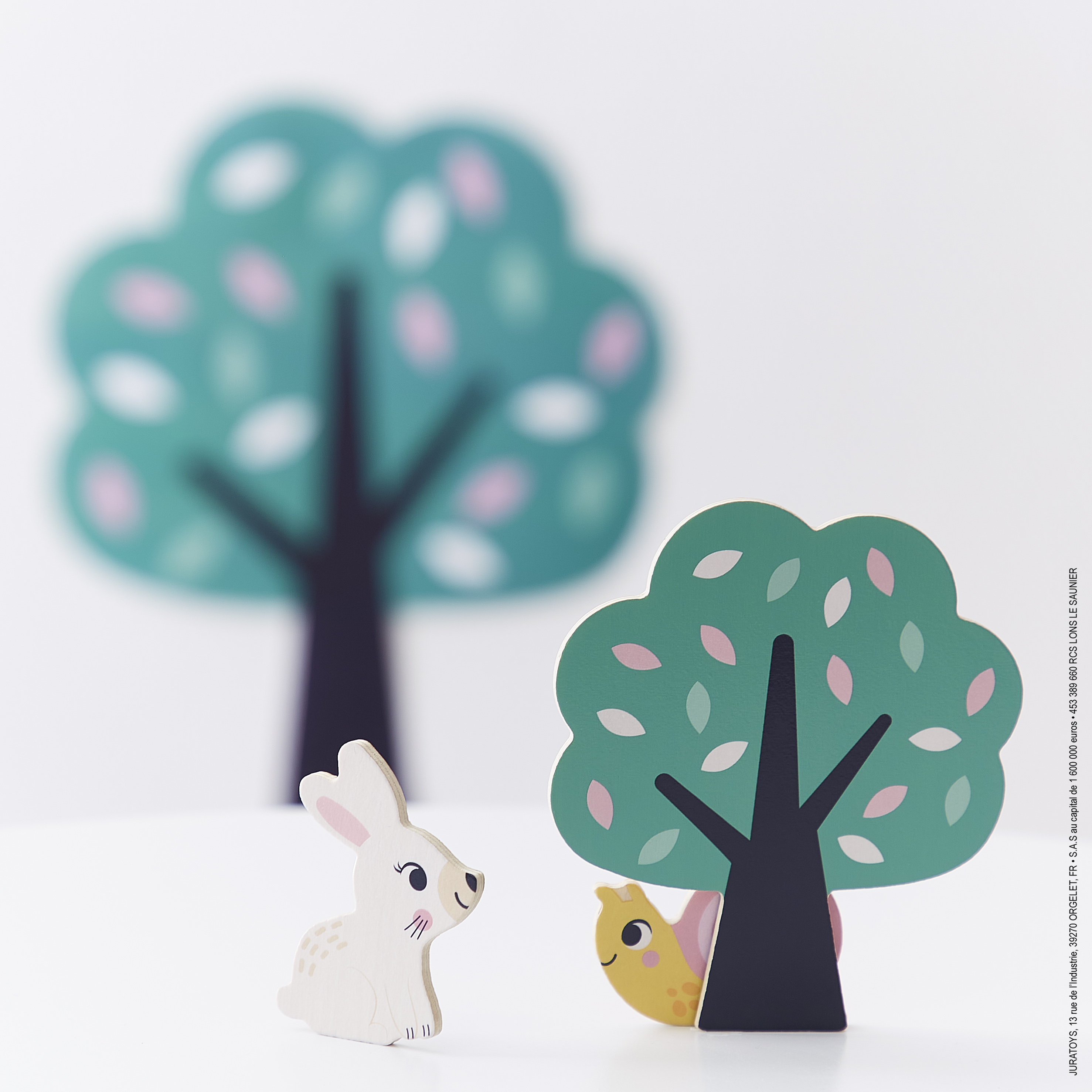First order? 1 free Gioia Trumpet with the code BIENVENUE-JANOD
Free shipping from €40 of purchase 🎁
Vous devez avoir un compte pour pouvoir utiliser cette fonctionnalité.
Connexion InscriptionA child develops his skills thanks to the psychomotor, sensorimotor and relational stimulation, he experiences from a very young age. He needs games, time to share, manipulation to stimulate his thinking, his imagination and develop his brain.
It is with the goal to learn while having fun that our teams have imagined the "educational" collection.
11 educational games in FSC® wood make up this range, they allow children from 2 years old to learn the first concepts covered in kindergarten and offer several levels of difficulty and the possibility of playing independently or in pairs.
The following customer reviews have been translated from French:
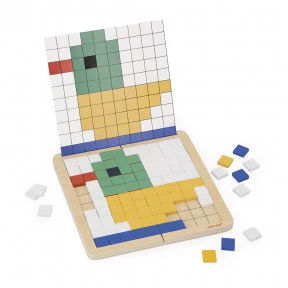
Mosaic Symmetry and Coding
Piece by piece, shapes appear! With this educational game, children from the age of 5 will become experts in coding and symmetry. It comprises a 17.6 x 17.6 cm wooden board, 200 wooden tokens, 10 model cards and a storage bag. This educational game offers 4 different play modes. Superposition: children place a model card on the board and place the tokens on top; Reproduction: children place the model card in the notch on the board, facing them, and position the elements on the board; Symmetry: children place half a card on the board and reproduce the pattern by symmetry on the other half; Coding: children follow the numbers and colors indicated on the card to reproduce and discover the illustration on the board. Suitable for all levels of progress, this symmetry and coding game helps develop concentration, observation skills, logic and recognition of numbers and colors. This educational wooden game can be played with young children, in groups, independently or accompanied by an adult. The pieces make it easy to create pixelated figures, perfect for kindergarteners! This educational game for learning coding and symmetry is made from FSC™-certified wood and cardboard. It's part of the Janod educational range, developed in collaboration with a school teacher to best stick to the learning and curricula of each level.
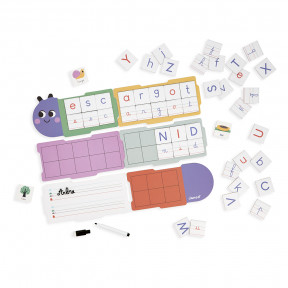
Learn to write - Caterpillar
An educational game dedicated to learning to write, in the form of a caterpillar! Suitable for children aged 4 and over, it teaches the alphabet and the 3 types of writing used at school (upper-case script, lower-case script and cursive). To become an ace letterer, the game consists of : 6 boards (including 1 with an erasable surface on the reverse for practice), 1 dry-erase marker, 78 letters (each of the 26 letters of the alphabet in 3 types of writing), 26 illustrated model cards. Created in collaboration with a psychomotor therapist specializing in learning to write, this educational game offers several levels of difficulty. First, you learn to recognize the letters and reproduce them. Then, you assemble the boards to enlarge the caterpillar and arrange more and more letters. You can even write simple words, using the illustrated cards to identify the pronunciation of each letter. Whether accompanied by an adult or on their own, children can progress at their own pace in the world of letters! This educational game for learning to write is made from FSC™-certified wood and cardboard. It's part of the Janod educational range, developed in collaboration with early childhood experts in order to stick as closely as possible to the learning and curricula of each level.
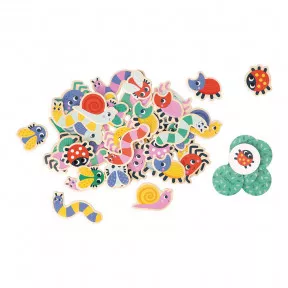
Seek & Find - Garden
Has anyone seen a blue and yellow snail? With this garden-themed Seek and Find game, children aged 2 years and up will develop their sense of observation through play. Their objective: to find the insect indicated on the card amongst the pile of other insects. This educational wooden game consists of: 42 insects (7 caterpillars, 7 ladybirds, 7 snails, 7 beetles, 7 spiders and 7 flies), 42 round cardboard cards and 1 ultra-practical cotton bag to easily store and transport the game! Just like a board game, this Seek and Find game can be played with two people: the adult will verbally describe the shape and colour of an insect, then the child must find it in the pile. Several children can also play together, by either taking turns or working together to find the little creatures! In “independent” mode, your little one can draw a card and take their time to find the correct animal. The main advantage of this observation game is its modularity: the pieces get switched around with every round so your child will not get bored or have chance to memorise the locations of the elements. Furthermore, adults can vary the level of difficulty by spreading the pieces out more or less on the table, asking children to grab the piece in question with their opposite hand, or limiting their number of tries! An educational game that evolves according to the pace of younger and older children. Each piece boasts unique characteristics (shapes and colours): be careful not to confuse them! The garden is an environment conducive to exploration, curiosity and adventure: the little creatures always amuse and surprise children. This is why we have chosen to put these insects in the spotlight in this Seek and Find game. It promotes observation, visual acuity, fine motor skills and colour recognition: ideal for nursery-age children and up. This observation game is made of FSC™-certified wood and cardboard. It is part of the Janod educational range, developed in collaboration with a school teacher to ensure the best possible fit with the learning and curriculum at each level.
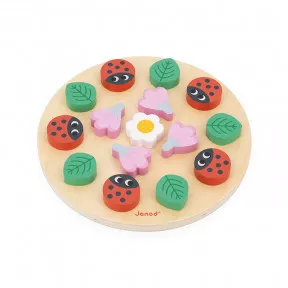
My First Mandala - Garden
Welcome to my garden! With this pastoral-themed educational game, children aged 2 years and up will develop their imagination and sense of observation through play. There are 2 game mode options for a perfect balance between concentration and ingenuity. The first mode of play consists of placing the different elements on the board according to a model card: little ones are tasked to carefully observe, concentrate and learn to identify the location of each piece in relation to the other pieces. The second mode of play prompts adults to verbally describe the proposed model; the child must then identify the location of the pieces on the mandala. Little ones can therefore offer an educational game to children that they can either play alone or in pairs, in order to always adapt to their pace of progress. And once the learning portion is over, it’s time to play! Let your toddler create their own little garden and arrange the elements as they wish. This wooden game consists of: 1 wooden board, 5 bees, 5 pink flowers, 5 daisies, 5 leaves, 5 ladybirds and 12 models. Ideal for helping develop children's imagination and sense of observation. This educational game will immerse little ones into the curious garden universe. It is made from FSC™-certified wood and cardboard. This early years mandala is part of the Janod educational range, developed in collaboration with a school teacher to ensure the best possible fit with the learning and curriculum at each level.
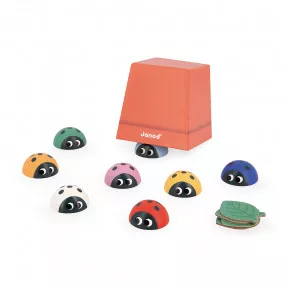
Memory Game - Ladybugs
Let’s head to the garden for a game of hide and seek! This pretty ladybird-themed memory game will prompt children aged 2 years and up to develop their sense of observation. This scalable game boasts 2 levels of play: first off, you can hide a ladybird under the flower pot and ask the child to find the missing insect by testing their memory. The second level involves prompting children to observe a logical sequence of coloured ladybugs before hiding them behind the cardboard bush: your toddler will then have to reproduce the sequence of colours using the tokens. However they decide to play, your child will win “trophy” leaves that they will enjoy accumulating as they progress! This educational game consists of: 8 coloured ladybirds, 16 wooden tokens, 1 cardboard flower pot, 2 cardboard bushes and 10 “trophy” leaves. A cotton bag is also included to better store and carry all the pieces. The garden is a source of discoveries and experiences for children, even from a very early age. And it’s always when you least expect it that a pretty ladybug lands on you! This is why these mischievous little insects are in the spotlight in this edutainment game. Each game is played by 2 people, either two friends or with an adult for a learning experience adapted to the child's pace. Little ones can create colourful sequences of varying length and complexity, to help bolster their progress. This game for nursery-age children is ideal for stimulating their memory and sense of deduction, whilst allowing them to work on the concept of logical sequences and colour recognition. This educational game is made from FSC™-certified wood and cardboard. It is part of the Janod educational range, developed in collaboration with a school teacher to ensure the best possible fit with the learning and curriculum at each level.
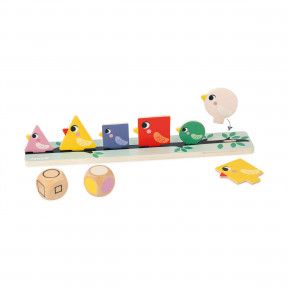
Sorting Shapes, Sizes And Colours - Birds
Shapes, sizes and colours will no longer be obstacles for your clever little ones, thanks to this pretty wooden educational game for children aged 2 years and up. The birds are out and there are lots of different kinds! Let's learn to differentiate them according to their distinctive feature, whilst having fun! Who will be the shape-sorting champion? This sorting game comprises 72 wooden birds: square, circular, big, small, green, blue, etc... they’ve gotten all mixed up, let's help them find their family. Children will roll the dice to locate the desired colour, shape and size. They will be able to cross-reference this information and place the birds in question on the branch during independent play. Smart: the 2 branches allow 2 children to play at the same time and they could even challenge each other! This game is also ideal for developing hand-eye coordination. Made from FSC® wood. It is part of an educational range developed in collaboration with a school teacher, in order to best match the learning and progress at each level.
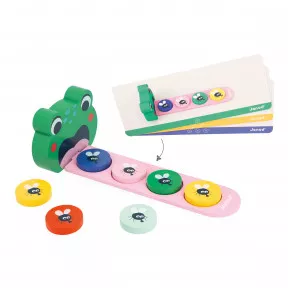
Algorithms - Frog
It’s time to learn and play with our greedy frog! 36 yummy flies are on the menu! But beware, the batrachian is very particular and there is an order that must be followed so he can properly digest these delicious delicacies. Children aged 3 years and up will have fun with the logical sequences, whilst reinforcing their nursery teachings and developing their visual acuity. This educational game will help children learn to differentiate colours and identify a logical sequence. They will be tasked to reproduce a series of colours according to the example indicated on one of the 12 double-sided model cards. Once this notion has been mastered, you can join in the fun and help the children learn algorithms and simplify this notion, thanks to our pretty wooden frog. Its long tongue - composes of 3 interlocking wooden pieces - allows a good number of flies to be arranged and the sequences to be repeated. This toy is made from FSC®-certified wood and cardboard. It is part of an educational range developed in collaboration with a school teacher, in order to best match the learning and progress at each level.
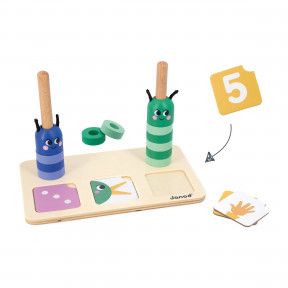
Number Composition And Comparison
It’s so much easier to learn how to break down numbers when it’s fun! Our 2 mischievous caterpillars are on hand to help toddlers learn to count and compare! This pretty wooden educational game - suitable for children aged 3 years and up - will make this concept easier to grasp by physically displaying the numbers and manipulating them in terms of volume. Children will have to use the coloured beads, forming the body of the caterpillars, to reproduce the numbers indicated on the 33 game cards. The numbers may be shown as digits, fingers on the hand or dice throws. By stacking the beads onto the wooden stand, your child will understand how many beads to add or remove from the caterpillar’s body to obtain a given quantity. Once this first step has been mastered, it will be time to touch upon the notion of comparison, e.g. “greater than” and “smaller than”, with the help of the special cards. The instruction leaflet will help you make the most of this game intended for little ones. This game is part of an educational range developed in collaboration with a school teacher, in order to best replicate the learning process and progress made at each level. Made from FSC® wood and cardboard.
This range was designed in collaboration with a school teacher. It allows children from 2 years old to learn the first concepts covered from kindergarten.
"How does it work?, "How can I understand and solve a challenge?": so many questions that a child must be able to ask himself. And Janod's mission is to support him in his development by preparing to explore his world.
Some learning can be abstract for the little ones. The manipulation of game elements allows them to try various combinations and learn at their own pace by trial and error, in a more concrete way: they then learn without even realizing it!
Offering an educational game to your child allows him to deepen notions learned in class through an enriching activity, with real educational value.
The games in this collection are part of our desire to offer children playful and evolving materials, to allow them to experiment and thus build themselves step by step, while having fun!
"In kindergarten, teachers often set up independent workshops so that children always have an activity to do when they have finished their work."
Marie, school teacher
With the educational games in this collection, you can reproduce educational workshops at home! This range is suitable for key kindergarten learning and for use in the classroom or at home.
At school, the little ones can take part in fun workshops with several people to discover a specific concept. They then participate in turn, or collaborate to achieve a common goal: that is so much fun! They can then move on to the next workshop, which allows them not to get bored and to stay focused on their activity.
Children can play alone at home to experiment at their own pace. They take the time to observe, to manipulate... To discover independently. They will take initiatives and will perhaps be less afraid of making a mistake! It is a moment of discovery that belongs only to them.
Accompanied by an adult, the game takes on a whole new dimension: "Try to place the rabbit behind the tree", "Can you show me the number 5?" The possibilities are endless! These moments of exchange and sharing with an adult or other children are rich in learning, they make it possible to adapt the game to the progress of the little ones and to unlock situations where they sometimes need to be more guided to understand.
"For the majority of games, I think it is necessary to go through a discovery with an adult [...] Once the child has understood the principle of the game, he can of course use it alone or with other children.”
Marie, school teacher
The great advantage of wooden games is their durability. The materials are noble and resistant, the toys can be transmitted and handled again and again by several generations of curious kids! All the toys in this collection are made of wood and FSC® certified cardboard.
To be always more durable, these educational games have been designed with several levels of play. Scalable, they adapt to the progress of the youngest and can thus be used from 2 years old and up to 6 years old .
A skill is mastered and a certain confidence is gained? Yay! Now, time for a new challenge! Add elements to make the game more complex, turn the cards over to discover new variations or invite the children to self-correct!
The games in the Educational range are supplemented by a multitude of elements that you can gradually introduce to your child's game mechanics, all on the same wooden support: new challenges are then offered to the little ones!
The whole family loves to see the children progress and master new skills every day. Offering new variants to educational games for toddlers means giving them the opportunity to see further to always surpass themselves, learn and grow!
1. What age group are these games for?
The games in the educational range are aimed at children between 2 and 6 years old.
2. What are the main skills worked on in kindergarten?
In kindergarten the skills are divided into five domains. The great skills worked are all important and are very numerous, here are those that correspond to the games in which I was able to participate:
- Communicate with adults and with other children through language by making themselves understood,
- Express oneself in a syntactically correct and precise oral language,
- Use the lexicon learned in class appropriately,
- Reformulate your remarks to make yourself better understood,
- Rephrase the words of others,
- Practice various uses of oral language: tell, describe, evoke, explain, question, offer solutions, discuss a point of view.
- Evaluate and compare collections of objects, make collections,
- Mobilize analogical symbols (constellations, fingers, numbers) to communicate oral and written information on a quantity up to 10 at least,
- Quantify collections up to 10 at least: compose them and break them down by effective and then mental manipulations,
- Say how much to add or remove to obtain quantities not exceeding ten,
- Talk about numbers using their decomposition,
- Start comparing two numbers less than or equal to 10 in digits,
- Begin to solve problems of composition of two collections, addition or withdrawal, product or sharing;
- Classify objects according to characteristics related to their shape, their capacity, their length, their mass,
- Recognize some solids (cube, pyramid, ball, cylinder),
- Know how to name some plane shapes in all configurations and orientations,
- Reproduce an assembly from a model (puzzle, tiling, assemblies of solids),
- Identify a regular organization and pursue its application.
- Order a series of photos or images, to reflect a situation experienced or a fictional story heard, by marking exactly succession and simultaneity,
- Situate objects in relation to oneself, to each other, in relation to reference objects,
- Use appropriate spatial markers (in front, behind, right, left, above, below, etc.) in stories, descriptions or explanations,
- Recognize and describe the main stages of the development of an animal or a plant, in a situation of observation of reality or on fixed or animated images,
- Know the essential needs of some animals and plants,
- Locate and name the different parts of the human body, on oneself or on a representation.
3. What was your role in designing this collection?
My role in designing this collection was above all to answer practical questions. Like the number of elements, the different levels, the practicality of setting up the game, the instructions, the possible setting up in class or at home... To give indications in order to avoid to reproduce constraints identified on games that already exist.
4. In class, in what setting/context do you offer these games to children?
In class these games can both be offered in a workshop, ie a group of children with the support of the teacher. Or for some in an independent workshop.
In kindergarten, teachers often resort to the use of independent workshops so that children always have an activity to do when they have finished their work. Indeed, we generally organize ourselves in groups, with a workshop led by the teacher, one by the ATSEM and one or two others independently. When working independently, students must be able to continue working even when they have finished their task.
In my class, these workshops are stored in a chest of drawers and divided by subject (“French”, “mathematics” and “science or fine motor skills”). When a child in autonomy has finished his work, he can go and take an autonomous workshop in the area indicated.
5. Are there several levels of play depending on the child's progress? How do these games fit their skills?
All the games in which I have participate are designed to evolve according to the age and progress of the child. Indeed, for me the games must have benefits to be used sustainably by a teacher, they must therefore be able to adapt to several levels and to all children.
6. Can the child play alone? Is the accompaniment of an adult necessary?
For the majority of games, I think it is necessary to go through a discovery with an adult before the child can play alone. Once the child has fully understood the principle of the game, he can of course use it alone or with other children.
7. Are these games made for classroom use by teachers only or can they be used at home?
These games can easily be played at home with the help of a parent.
8. How to use these educational games at home with children?
At home, it is important for me to really use them as games and not as learning. Children are particularly busy at school, they are asked for a lot of attention and concentration. So it seems to me that at home, it can be more of a possibility to play while “revising” the notions seen in class.
9. How to set up an educational workshop at home?
Educational workshops can be set up like at school. That is to say discover and understand them with the help of an adult, then be made available easily so that the child can use them alone when he wants.
10. What are your tips for encouraging a child to extend the knowledge acquired in class at home in a fun way, without it being seen as a chore/homework?
For me, everything must go through play without the child noticing. In everyday situations, for example the shower, playing Simon says to name the parts of the body, or cooking by naming the utensils or the ingredients... Playing simple board games, reading stories and ask the child to re-tell it himself.
Above all, it must be pleasant for him, if it is no longer pleasant, you must stop and not insist.
